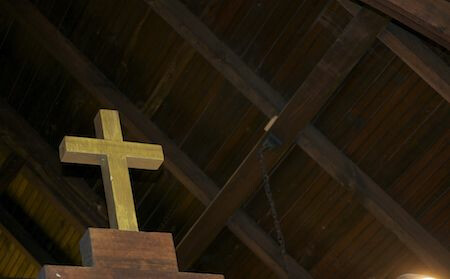To Number Our Days

A boy was praying. “God, how long is a second of time in heaven?” Dear boy (said God), a second of time in heaven is longer than a million years on earth.
“Wow!” the boy said. “And money, is money different in heaven?” Yes, dear boy (said God), even a penny in heaven is worth more than a million dollars on earth.
The boy thought about this, and then he said, “God, could I have a penny?”
“Sure,” said God, “just a second.”
---
Psalm 90 takes up the themes of old jokes like that one. Let’s walk through it.
“Before the mountains were brought forth, or ever the earth and the world were made, thou art God from everlasting.” God is the creator of all things, and he is God even “before” he does any creating.
The psalmist goes on: “For a thousand years in thy sight are but as yesterday when it is past.” A thousand years for God are as little as a “yesterday” or even as short as “a watch in the night.” And we, in this vast stretch of God’s time, are as short and transient as “a dream; we fade away suddenly like the grass.” You know how grass is? “In the morning it is green and flourishes;” but “in the evening it is dried up and withered.”
And not only is our time short; it is under God’s judgment. “Our iniquities you have set before you.” Even “our secret sins” are brought into “the light of thy countenance.”
How long might one of us live? At the time the Psalmist wrote, a good long life was 70 years: “The days of our age are threescore years and ten.” A strong person might make it to 80. And I suppose, we might say that “80 is the new 70” and hold that a person with good health might make it to 90. Yet even so, “the sum” of our years “is but labor and sorrow;” “they pass away quickly and we are gone.”
---
I thought of this a couple weeks ago when I was introduced to a 96-year-old man in coffee hour. He looked very young and healthy to me, although I noticed he didn’t stand up. With a smile he said that he figured God was keeping him around for some purpose, although he wasn’t sure what it was!
---
Psalm 90 has some hard truths in it, truths that we often need humor to grasp. To be human is to be finite. To be a sinner is to be found wanting. In God’s eyes it doesn’t much matter whether our lives are long or short. And for us, even a long life can be one of humiliations and hardship. What is the point?
The point is to realize that the most important thing is wisdom. So the Psalmist gets to the point: “So teach us to number our days that we may apply our hearts to wisdom.”
Augustine’s life pivoted on this very discovery: that nothing matters more than wisdom. It took him another decade to realize that true wisdom is what God offers us in Christ.
---
And there is also the Holy Spirit: When we realize the shortness and uncertainty of life—when we learn to number our days—we can turn to God and ask him to bring our work to completion. This is the logic of Psalm 90, which wraps up with a petition to God to fulfill our lives and bring our works to their proper end. We ask him to be “gracious,” to show us “mercy” so that we may “rejoice and be glad all the days of our life.” And then the punch-line: “prosper the work of our hands; prosper our handiwork.”
So in the end of the psalm, even though our days may be short and full of trouble, nonetheless there is the request that God will give us joy all our days and bring to fulfilment the works of our hands.
---
It is amazing what good moral teaching one can find by reading a psalm closely! What a wise practice our church offers us in the lectionary to read some of the Psalter every morning and every evening!
Now, if God would just give me a second ...
---
Out & About. On Ascension Day, Thursday, May 25, I am to preach at Church of the Incarnation, Dallas, at 7 p.m. in the Ascension Chapel.
This weekend, May 27-28, I am to preach at All Souls’ Church in Oklahoma City: Saturday at 5:30 p.m., and Sunday at 8 and 10 a.m.

